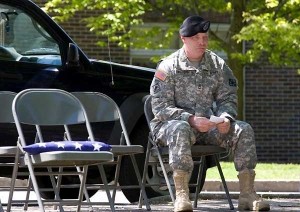Listening Post: A day to remember

Soldier waits his turn to speak at Memorial Day observances in Canton. Archive Photo of the Day (5/26/09) by Lizette Haenel
Monday is Memorial Day, and this weekend is the traditional beginning of the summer vacation season. It might be time to open camp for the season, to put in the boat, to have the first barbecue of the year, or (if you are so fortunate) to do all three.
Memorial Day is also, of course, a solemn civic holiday devoted to remembering our soldiers who died in war. It was initiated as a national occasion three years after the end of the Civil War and was then called Decoration Day, after the traditional observance of visiting and decorating soldier cemeteries.
I recall it as a major celebration in Potsdam when I was a child, and memories of the great national struggle of WW II were still fresh in the minds of its veterans, the survivors of the fallen, and the civilians who sacrificed to the war effort. Somewhere I still have a shell casing ejected from one of the M-1 rifles fired in salute over the Raquette River at the end of each year’s parade. Schoolboys like me, fascinated with the uniforms, the guns, and the war stories always scrambled in to get the prized brass.
The holiday may be less well-observed now. I think that’s a natural consequence when today, most people are more distant from the experience of war. Wars such as the Civil War and the two World Wars left few families untouched, and no communities unaffected. The wars of the last few decades have not been as all-absorbing to the nation, except of course to the relatively small percentage of Americans who have fought and died in them, and the families who love and support them. But for most of us, it has been possible to go about our business as usual.
I can’t say that this is a bad thing; who would wish our wars to have been bigger? Yet memory is strongest where you have some skin in the game. Fewer of us may feel that immediacy now. Despite my good fortune in never having to experience war face to face, I try to take a little time to remember the skin and kin of mine who have. My father and his brothers and cousins who all survived WWII somehow, though not unchanged. Or my childhood neighbors, disabled by trench warfare nearly a century ago now. My mother, who cranked out tungsten in a defense plant, or my college classmates still haunted by the jungles of Vietnam.
Who will you be remembering on Monday and why? Let us know in a comment below.








I have very vivid memories of Memorial Day parades when I was in a marching band in small town Wisconsin. It was always hot by then and we had a little bandstand in the middle of town. My dad was o ne of the local ministers so often gave the speech in honor of the day. One year our dog followed him downtown and when the military gun salute went off, she took off for home as if she had been shot out of a cannon ! Nothing still, moves me like watching veterans of all ages, in uniform solemnly marching and I tear up, as I did even as a 12 year old, to wonder of their memories when taps was played.
I think of Studs and his daily programs on WFMT, the radio companion of my youth and early adulthood. His shows for the holidays were always extra special, including of course his Memorial Day broadcast. This is from http://www.ferdyonfilms.com/tag/studs-terkel/
I couldn’t find his Memorial Day show online, but for anyone who wants the flavor of a Studs Terkel special program, the very famous “This Train” should do nicely:
http://kora.matrix.msu.edu/files/43/243/2B-F3-153-63-terkel-a0a1i9-a.mp3
Oh, sorry — I thought that was the entire show. Must do more digging….
On this Memorial Day, as on previous ones, I will have my father, a WWII US Marine, in my thoughts.
Shortly after 9-11, we sat down, and talked about his experiences.
To say he saw action would be true, but he saw it upclose and personal.
he was in it up to the gunwales, in the southern Pacific, meeting the enemy face-to-face on several islands, including major action on Guadalcanal.
Luckily, I had a tape recorder running, and after 60 years, he told a tale of horror, honor, and survival.
He returned to his beloved Ogdensburg after the war, and spent his life going about his business of raising a family and contributing to the community.
A true American hero, as a warrior and as a civilian, and a wonderful role model.
He had his demons, and they were evident, percolating just below the surface. As they say, there are no combat veterans without disability.
I remember, before and after our discussion, the opportunities we had to talk, but he only hinted at the nonsense and waste of war.
Therefore, on this Memorial Day, I will have my father on my mind. And the lessons he tacitly passed along. And I will consider the nonsense and waste of war, and will contemplate a planet without that nonsense and waste.